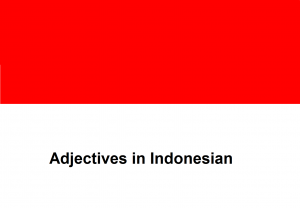Language/Indonesian/Grammar/Adjectives
Hello everybody,
Welcome to today's lesson on ¨ADJECTIVES¨ in Indonesian! 📚 As an experienced Indonesian language teacher, I am excited to guide you through the process of understanding and using adjectives in the Indonesian language.
In this lesson, we will cover the basics of Indonesian adjectives and how to use them effectively in your conversations. After mastering this topic, you might also be interested in exploring other related grammar lessons, such as Indonesian Grammar - Comparatives and Superlatives, Indonesian Grammar - Comparative and Superlative - Comparative, and How to Use Have in Indonesian.
Feel free to edit this page by adding new words and expressions to enhance your learning experience! Good learning! 😊
Adjectives in Indonesian[edit | edit source]
The way to say your feeling about something is easy when we use adjective.
In Indonesian, there is a common way in order to express it.
The pattern is Subject + Adjective for positive statement, and for the negative one is Subject + tidak + Adjective like as English.
Examples[edit | edit source]
For example:
- Kamu cantik.
You are beautiful.
- Rumah itu besar.
That house is big.
- Kucingnya putih dan lucu.
Her cat is white and funny.
- Dia tidak bodoh.
He is not fool.
- Buku-buku itu tidak berat.
That books are not heavy.
Adjectives[edit | edit source]
Here is some adjectives :
| English | Indonesian |
|---|---|
| Angry | Marah |
| Beautiful | Cantik |
| Big | Besar |
| Difficult | Sulit |
| Easy | Mudah |
| Far | Jauh |
| Fat | Gemuk |
| Fool/stupid | Bodoh |
| Funny | Lucu |
| Good (for things) | Bagus |
| Handsome | Tampan |
| Happy | Senang |
| Heavy | Berat |
| Kind/Good (for person) | Baik |
| Light in weight | Ringan |
| Lose out | Rugi |
| Lucky | Beruntung |
| Narrow | Sempit |
| Near | Dekat |
| Sad | Sedih |
| Short (for person, building) | Rendah |
| Short in size | Pendek |
| Slim (usually for woman) | Langsing |
| Slim/thin/emaciated | Kurus |
| Small | Kecil |
| Smart | Pintar |
| Tall | Tinggi |
| Thick | Tebal |
| Thin (for things eg. Paper, book) | Tipis |
| Tired | Capek |
| Ugly | Jelek |
| Wide/spacious | Luas |
and more, plus the pronunciation:
| ENGLISH | INDONESIAN | PRONUNCIATION IN
ENGLISH |
BRAZILIAN
PORTUGUESE |
| big (m) / | besar (m) / | beh sahr | grande / |
| big (f) | besar (f) | beh sahr | grande (fem) |
| other (m) / | lainnya (m) / | lah ihn nyah | outro / |
| other (f) | lainnya (f) | lah ihn nyah | outra |
| large (m) / | besar (m) / | beh sahr | largo / |
| large (f) | besar (f) | beh sahr | larga |
| heavy (m) / | berat (m) / | beh raht | pesado / |
| heavy (f) | berat (f) | beh raht | pesada |
| small (m) / | kecil (m) / | keh chihl | pequeno / |
| small (f) | kecil (f) | keh chihl | pequena |
| short (m) / | pendek (m) / | pehn dehk | curto / |
| short (f) | pendek (f) | pehn dehk | curta |
| thin (m) / | tipis (m) / | tih pihs | magro / |
| thin (f) | tipis (f) | tih pihs | magra |
| good (m) / | baik (m) / | bah ihk | bom / |
| good (f) | baik (f) | bah ihk | boa |
| dry (m) / | kering (m) / | keh rihn | seco / |
| dry (f) | kering (f) | keh rihn | seca |
| dirty (m) / | kotor (m) / | koh tohr | sujo / |
| dirty (f) | kotor (f) | koh tohr | suja |
| wet (m) / | basah (m) / | bah sahH | úmido / |
| wet (f) | basah (f) | bah sahH | úmida |
| correct (m) / | benar (m) / | beh nahr | correto / |
| correct (f) | benar (f) | beh nahr | correta |
| old (m) / | tua (m) / | tou ah | velho / |
| old (f) | tua (f) | tou ah | velha |
| new (m) / | baru (m) / | bah rou | novo / |
| new (f) | baru (f) | bah rou | nova |
| full (m) / | penuh (m) / | peh nooH | cheio / |
| full (f) | penuh (f) | peh nooH | cheia |
| cold (m) / | dingin (m) / | dihn gihn | frio / |
| cold (f) | dingin (f) | dihn gihn | fria |
| warm (m) / | hangat (m) / | hahn gaht | quente / |
| warm (f) | hangat (f) | hahn gaht | quente (fem) |
Other Lessons[edit | edit source]
- Why Learn Indonesian
- How to Use Be
- Future Tense
- Plurals
- Past Participle in Indonesian
- Past Tense
- Indefinite Articles in Indonesian
- Present Tense
- Questions

